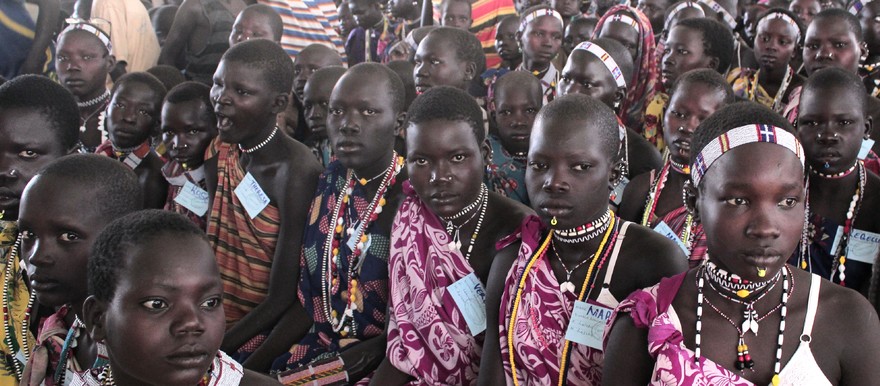Several parents in South Sudan’s Kapoeta State admit early and forced marriages are obstacles to girls’ education.
Early enforced marriage has long been practised in South Sudan, and so despite the legal marital age being 18, the youngest nation suffers from one of highest prevalence rate of child marriage in the world.
Esther Rija Iko, a parent in Kapoeta town, told Radio Tamazuj on Monday that tradition has destroyed thinking in communities.
“What is making girls not to come to school especially in Toposa land here is marriage. When a Toposa girl is brought to school, the parents will come from the village to collect her from school and will marry her off to an old man,” said Rija.
She added, “This is what makes us unhappy on the issue of early and forced marriage”.
Martha Nangolio, a resident of Narus in Losolia County, said the Toposa community believes girls only bring cows.
“This problem is true. The Toposa do not allow girls to go to school. They say girls bring them cows. In Toposa culture, even a 13 year-old child is given to a man,” said Nangolio.
She admits that educating girls helps in transforming the community.
“It is important for girls to study and because of the ignorance of our people in villages, we need to talk to them slowly, they will understand. I advise that girls be brought to school in big numbers,” she stressed.
The head of St. Mary Magdalene Primary School in Riwoto County, Sister Rita Proscovia said girl child education remains a challenge in the area because most parents want cows and wealth from girls.
“They do not send girls to school. They send them to school when they are still small but as soon as they turn 10 or 11, they snatch them out of the school,” she said.
The headteacher said she witnessed a number of cases where parents came to the school compound to snatch girls for marriages.
She expressed concerns that most of the girls forced into early marriages tend to be abandoned by men when they give birth.
“My experience even after giving birth, the people who impregnate these girls do not even take care of them,” said Sr. Mary.
Meanwhile, the commissioner of Losolia County, Kotein Thomas said government has even violated the constitution to make things right.
“Day and night, we have to work hard, we have to think even beyond the rules and the constitution so that we make their lives at least better because with the ideology they have, they cannot accept some of the good things,” said Kotein.
The commissioner said people were capable of rejecting even a dam in a place with no access to a borehole, saying it will stop rain.
“What will change them later on is when their children are educated and as a county government, we are not going to get tired of talking to them. We need to preach to them,” he stressed.
Kotein said all efforts are in place to improve education in the area.
“We are integrated in the agenda of education in every activity. Sometimes, they [parents] give us burden; they will send their children saying you go to the commissioner and priest who will educate you without supporting the child in the form of buying shoes and the other things. But we take this children to school and continue educating their parents to take care of their own children,” he explained.
Forty percent of girls in sub-Saharan Africa reportedly marry before the age of 18, and African countries account for 15 of the 20 countries with the highest rates of child marriage.



